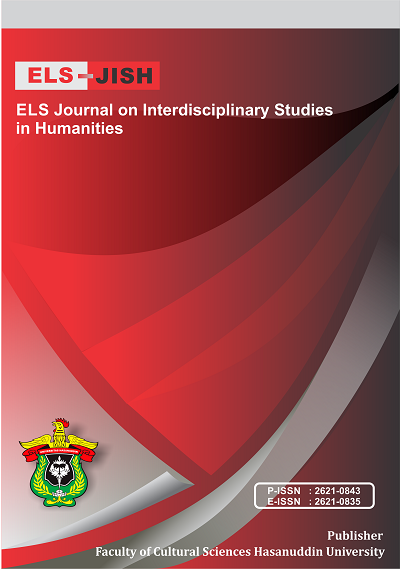Vocabulary Learning Strategies Used by the High- Proficiency Learners
DOI:
https://doi.org/10.34050/elsjish.v6i1.26142Keywords:
High Proficiency Learners, grammar learning strategies, VocabularyAbstract
Vocabulary learning strategies played a significant role in EFL learners’ vocabulary acquisition. All language learners use their own chosen vocabulary learning strategies; however, appropriateness in selecting strategies can lead them to success. The objectives of the study were to explore the vocabulary learning strategies used by high-proficiency language learners of the Department of English at Jagannath University, Bangladesh, and to describe the reasons behind choosing these strategies. A mixed-methods approach was used. Thirteen high achiever undergraduate students of the Department of English, Jagannath University, Bangladesh, participated in this research. An adaptation of Schmitt’s (1997) questionnaire, learners’ scores, and interviews were used as instruments to collect data. The result showed that the Cognitive (Consolidation) Strategy Category no. 25: “I repeat the word to myself” was the high achievers’ most frequently used strategy. The next preferred strategies were Determination (Discovery) Strategies Category no. 4: “I guess the meaning from the context” and Category no. 5: “I use an English-Bangla dictionary.” The Memory (Condensation) Strategy Category no. 17: “I connect the word to a personal experience”, Cognitive (Condensation) Strategy Category no. 29: “I take notes about the new words”, and Determination (Discovery) Strategy Category no. 6: “I use an English dictionary” were in the third position. These strategies ensured their spontaneous learning and aided them in becoming autonomous learners. The findings of this study will contribute to learners, teachers, and researchers.
References
Adam, S., & Magfirah, S. (2022). Vocabulary Strategies for English Learners. ELS Journal on Interdisciplinary Studies in Humanities, 5(3), 563-572.
Ahmed, M. D. (1989). Vocabulary learning strategies. In P. Meara (Ed.), British Studies in Applied Linguistics: Vol. 4. Beyond Words (pp.3–14). British Association of Applied Linguistics/Centre for Language Teaching.
Andini, C., Sosrohadi, S., Fairuz, F., Dalyan, M., Rahman, F. F., & Hasnia, H. (2022). The Study of Japanese Women in the Facial Treatment Advertisement: A Semiotics Perspective of Pierce’s Theory. ELS Journal on Interdisciplinary Studies in Humanities, 5(2), 337-347.
Arif, M. R. (2021). Exploring vocabulary learning strategies adopted by Bangladeshi tertiary level students (Doctoral dissertation, Brac University).
Bristi, N. L. (2015). Exploring vocabulary learning strategies used by Bangladeshi undergraduate EFL Learners: A comparative analysis of three proficiency level learners. Global Journal of Human-Social Science: G Linguistics & Education, 15(12), 1-11.
Brown, C., & Payne, M. E. (1994). Five essential steps of processes in vocabulary learning. TESOL Convention, Baltimore, MD.
Carter, R., & McCarthy, M. (2014). Vocabulary and language teaching. Routledge.
Chamot, A. U. (1987). The learning strategies of ESL students. In Learner Strategies in Language Learning (pp. 71–84). Prentice Hall International.
Elzubier, E. A. (2016). Vocabulary learning strategies used by Sudanese EFL learners at university level. Research Journal of English Language and Literature, 4(4), 512–524.
Gu, P. Y. (2018). Validation of an online questionnaire of vocabulary learning strategies for ESL learners. Studies in Second Language Learning and Teaching, 8(2), 325–350.
Gu, Y., & Johnson, R. K. (1996). Vocabulary learning strategies and language learning outcomes. Language learning, 46(4), 643-679.
Hasnia, H., Andini, C., Tahir, M. D., Hunaeni, H., Zulfikariandi, Z., & Muslimin, M. T. (2022). The Ability of 1st Class Students of SMAN 11 Enrekang to Arrange Verbal and Nominal Sentences. ELS Journal on Interdisciplinary Studies in Humanities, 5(3), 539-550.
Hatch, E. & Brown, C. (1995). Vocabulary, Semantics, and Language Education. Cambridge University Press.
Hoque, M. A. (2017). Context-based strategies for teaching vocabulary at the secondary level in Bangladesh. The EDRC Journal of Learning and Teaching (EJLT), 3(4), 11-25.
Jahan, A. & Jahan, N. (2011). Working with vocabulary at tertiary level in Bangladesh. Journal of Education and Practice, 2(5), 45-57.
Nakamura, T. (2000). The Use of Vocabulary Learning Strategies: The case of Japanese EFL learners in Two Different Learning Environments. [Unpublished PhD thesis]. University of Essex.
Prihandoko, L. A., Al Ahmad, A. S. M., Fredy, F., & Rahman, F. (2022). Multi-Regression Analysis of Factors Influencing Perceived Academic Writing Competence (PAWC) of Vocational School Students. OKARA: Jurnal Bahasa dan Sastra, 16(2), 329-348.
Rahman, F., & Weda, S. (2019). Linguistic deviation and the rhetoric figures in Shakespeare’s selected plays. XLinguage" European Scientific Language Journal", 12(1), 37-52.
Rahman, F., Abbas, A., Hasyim, M., Rahman, F., Abbas, A., & Hasyim, M. (2019). Facebook Group as Media of Learning Writing in ESP Context: A Case Study at Hasanuddin University. Asian EFL Journal Research Articles, 26(6.1), 153-167.
Rubin, J. (1975). What the “good language learner” can teach us?. TESOL Quarterly, 9(1), 41–51.
Schmitt, N. (1997). Vocabulary learning strategies. In Vocabulary: Description, Acquisition and Pedagogy. Cambridge University Press.
Prihandoko, L. A., Al Ahmad, A. S. M., & Rahman, F. (2022). Revitalizing Hospitality, Managerial, and English for Tourism Purposes Skills: Community Partnership Program for Hotel Employees in Merauke Regency. ABDIMAS: Jurnal Pengabdian Masyarakat, 5(2), 2524-2531.
Downloads
Published
How to Cite
Issue
Section
License
Copyright (c) 2023 Tania Tahmina

This work is licensed under a Creative Commons Attribution-ShareAlike 4.0 International License.






